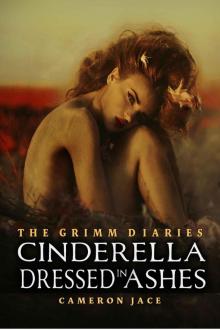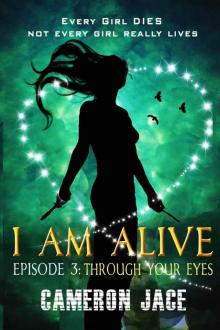- Home
- Jace, Cameron
Cinderella Dressed in Ashes ( Book #2 in the Grimm Diaries )
Cinderella Dressed in Ashes ( Book #2 in the Grimm Diaries ) Read online
CINDERELLA DRESSED IN ASHES
The Grimm Diaries Book Two
by Cameron Jace
www.cameronjace.com
edited by Melody Benton
Copyright © 2013 Akmal Eldin Farouk Ali Shebl
All rights are reserved. No part of this book may be used or reproduced in any manner whatsoever without written permission from the author.
Cover Art by Cristina Otero
https://www.facebook.com/cristinaoterophotography
Model:
Cristina Otero (the perfect Cinderella)
This book is a work of fiction. The names, characters, places, and incidents are products of the writer's imagination or have been used fictitiously and are not to be construed as real. Any resemblance to persons, living or dead, actual events, locales or organizations is entirely coincidental.
The following quotes might be too many, but if you come back to them after you finish reading the book, I believe you will appreciate them even more.
‘Evil is a point of view.’
~Anne Rice
‘Enjoy life. There's plenty of time to be dead.’
~Hans Christian Andersen
“Love is like death, it must come to us all…but never can it be cheated, and never will it be forgotten.”
~Jacob Grimm
“…for obvious reasons, I have changed the names of the people and places concerned…”
~Bram Stoker
in his preface to the 1901 Icelandic edition of Dracula.
All historical facts mentioned in this book are real, documented, and well researched. The interpretations and connection made are a work of fiction though.
Table of Contents
Table of Contents
PROLOGUE
A Splinter of Mirrors
1
The Phoenix
2
A World Between Dreams
3
The Slave Maiden
4
A Garden of Graves
5
The Heart of the Art
6
The Mermaid’s Milk
7
A Field of Dreams
8
A Never Ending Dream
9
Of Tears and Sand
10
The Girl with One Glass Shoe
11
The Princess and the Pauper
12
A Trail of Breadcrumbs and Candy
13
A Sack Full of Dead Children
14
A Breath of Magic
15
The Forbidden Art
16
A Bird of Fire
17
A Puzzle of Seven Cards
18
Rainbow’s End
19
Pandora’s Box
20
Fable’s Charm
21
A Massacre in Furry Tell
22
The Name of the Huntsman
23
A Grimm Girl
24
A Slash from the Past
25
The Name of the Necklace
26
A Way Out
27
A Cruel Choice
28
A Splintered Clue
29
An Insurmountable Spirit
30
The Weighing of the Soul
31
A Conversation with Death
32
A Secret Revealed
33
A Breath of Life
34
A Path of Butterflies
35
A Wit of Swords
36
The Cottage and the Wolf
37
Soulbound
38
A Girl with no Hands
39
Back to Candy House
40
The Guardian
Afterword
PROLOGUE
A Splinter of Mirrors
The Children of Hamlin didn’t care for the woman in the luxurious black veil.
She claimed that Charmwill Glimmer sent her to tell them a crucially important story, one that would expose a great secret about the evil in the Fairyworld.
Still, the children didn’t like that most of her face was concealed. They could only see her distant blue eyes and long eyelashes, and the silken white gloves she wore.
“Where is Charmwill?” the lisping girl asked suspiciously. “Why can’t he tell us the story himthelf?”
“Charmwill is on a faraway quest,” the woman said. “It might take him years before he comes back.”
“That explains why he didn’t appear last Christmas,” a boy supposed. “Santa Claus was worried about him.”
Another boy suggested Charmwill was fighting the evil entities that wanted to steal the Book of Beautiful Lies.
“No, that’s not why he’s away,” a girl with gaping front teeth interrupted. “He’s with The Boy Who was a Shadow, right?”
“Something like that,” the woman nodded. Her voice was flat and lacked passion. She wasn’t as cheerful as Charmwill, reminding them of their overly conservative parents in Hamlin. She hadn’t even allowed them to play with her veil the way Charmwill let them play with his beard—and she didn’t have a parrot!
“So do you also have a Book of Beautiful Lies?” a boy asked.
“I’m afraid not,” the woman replied, a bit confused.
“Then how will you tell us your story?” the gapped tooth girl frowned.
“Charmwill helped me memorize it,” the woman answered.
“But Charmwill said stories had to be written down,” a girl from the back interrupted. “He said memorizing stories wasn’t enough, because one person tells the story to another, then another, and then another. In the end, the final story will come out different than the original.”
The mysterious woman sighed. She was doing her best not to burst out screaming, “trust me!” She inhaled all the air she could, “I made sure I memorized this story word for word. It’s an important one,” she tilted her head slightly, gazing at them from behind the fire. There was something strange about her eyes. “May I ask why you all call him Charmwill?”
The children laughed mockingly at her, “because he is the famous Charmwill Glimmer, the best storyteller in the world.” A girl said and raised her hands in the air. Other kids imitated her.
“So he has never told you his real name?” The woman’s eyes dimmed with confusion.
“What are you talking about?” the lisping girl asked. “That is his real name!”
The woman squinted behind the fire. She was thinking while rubbing her chin over the veil. A moment later, her eyes widened, “I was just joking with you. Of course, that’s his real name. Now if you don’t mind, I’d like to tell my story,” she rubbed her hands together with fake enthusiasm.
The boys and girls sighed, a bit sleepy, mumbling a ‘yes’ or two between the lot of them. They doubted anyone could match Charmwill’s skills in storytelling, but thought they would give her the chance to try.
She began, “Once upon a time…”
“Is this going to be boring?” the lisping girl asked. “All stories that start with ‘Onth upon a time’ end with ‘And they lived happily ever after.’ It’s so boring.”
“So lame,” a boy commented.
“As if we don’t know how it’s going to end,” the girl from the back said. “That’s why we like Charmwill’s stories. They are different. Full of darkness, humor, intrigue and mys
tery.”
“Yeth. You never know who’s who in his stories,” the lisping girl said. “And it’s hard to tell who’s good and who is evil.”
“Oh, so you don’t like it when you can differentiate between good and evil?” the woman inquired.
“Charmwill said there is nothing absolutely good or evil,” the girl in the back said. “It’s our choice to make it one way or the other.”
“Indeed,” the woman in the veil looked like she was smiling behind the luxurious fabric. “Evil is a point of view.”
“So why does everyone else tell us happy and clichéd storieth? Who do they think we are? Children?” the lisping girl protested.
The woman in the veil sighed again. It was a longer sigh, and it exposed her lack of patience with children. Her blue eyes grew more distant as if she secretly loathed them. “When I was your age, I used to love those happy, fluffy stories,” she said, almost regretfully.
“I bet you don’t like them that much now,” the girl in the back said.
“You bet I don’t,” the woman in the veil rolled her eyes. “Like I said, Charmwill told me to tell you this story, so it’s full of all the horrible things you just asked for. In fact,” she leaned closer, the children’s reflection showing in her eyes, waving in the flaring fire. “This particular story has the devil in it.”
A couple of children leaned back as if the woman breathed fire in their faces. The lisping girl bravely stretched her hands to protect the rest.
“So this story is really scary?” the girl from the back asked.
“Very scary,” the woman’s voice changed and her eyes sparkled. “You can tell from the very first sentence. Listen: On a dark and stormy night…”
The wind hissed and puffed around the fire, and the children sensed a dark spirit behind them in the forest.
Slowly, they leaned forward. Scary was exciting and fun. They were willing to listen.
“On a dark and stormy night in Hell,” the woman in the veil began. “The devil was bored.”
The girl in the back omitted a laugh. It sounded as if she was sneezing. The woman threw her a piercing look and the girl froze.
“The devil, who was nothing but a short and ugly looking troll, spent most of his time trimming his nails, shooting darts, popping his knuckles, and rubbing the three little hairs he had left on his head,” the woman in the veil elaborated. “He tried to fish in one of Hell’s many lakes but the fish came out fried. Nothing eased his boredom until one of his students brought him a gift, a mirror.
“He hadn’t seen such a mirror before, and being infatuated by his own image, the devil played chess with his reflection. It was an intense game. His reflection was smart, and it replicated almost all of his moves and then added its own genius touch. Surprisingly, the devil, who thought he’d never lose a game—for he was master of evil play—, lost to his reflection in the mirror,” the woman’s eyes scanned the children, making sure they followed with attention. The children felt unsettled by her voice. It had enough power to cement their feet to the ground. Her voice was the color of fear.
“Appalled by his reflection beating him in the chess game, the devil asked about the origin of the mirror,” the woman continued. “In his time, humans hadn’t invented mirrors yet. Someone from an unknown realm had sent him this mirror. The students who found it claimed a lady had just flung it while walking in a burning garden.”
“The devil pulled the mirror along and made his students look into it. The mirror turned their faces into ugly shapes like those you see in a funhouse; only this one truly reflected the bad side in people. Amused, he directed the mirror toward a landscape known for its beauty. Instead of seeing beautiful greens, he saw the place as if it were boiling like rotten spinach then combusting into flames.”
“’Whose mirror is this?’ the devil asked.
“One of his students claimed that the mirror whispered to her when she held it. She said the mirror claimed it had a name, the Anderson Mirror.
“The devil began to search for this Anderson but couldn’t find him because there were too many people who shared the name.
“Eventually the devil decided he didn’t care who’d invented such a wicked mirror. He intended to use it, so he walked to the edge of Hell and gazed through his telescope, peering over at Heaven. People were always too happy and giggly there, drinking milk from vines dangling from rainbow colored trees, swimming in milky rivers, and lazily having the time of their lives—well, afterlives in their case.
“Two ideas popped in the devil’s head in the shape of two ugly horns—that’s how he got his horns, by the way. They ended up being permanent tumors on his head. One of the ideas he forgot and could never remember. The other is the one I want to talk to you about.”
The girl in the back snickered again, making two horns with her finger. A few children imitated her. The woman in the veil directed one of her scary looks over the crowd of children again so they would stay silent.
“A big smile shone on the devil’s reddened face,” the woman continued, trying her best to appeal to the children. “He took the mirror and went over to the edge of Heaven, focusing it on people’s faces so they’d see the worst in themselves. He thought it would be a good way to tempt some of the people over there to join him. The devil never believed himself to be evil, actually. He thought all he did was bring out the worst in people, just as this Anderson Mirror did.
“Peering, like a peeping tom, at the pearly gates, the devil lost his balance and dropped the mirror.”
The children, still listening to the story, held their breath.
“The mirror fell all the way down to earth,” the woman stretched her arms like a magician toward the skies.
The children held hands and stared up at the night sky, worried.
“The evil mirror splintered into millions and millions of shards onto the world,” she narrated. “Each splinter tinier than a grain of sand, but filled with enough darkness to consume one’s soul.”
The children blinked their eyes, still staring at the sky above.
“The mirror’s splinters entered people’s eyes without their knowledge. No one got hurt, because evil never hurts in the beginning. It stays with you and grows until its final sting drops you to the floor.”
The children couldn’t take it anymore, lowering their heads and rubbing their eyes as if waking up from a bad dream. Some made their friends check their eyes for splinters.
“Although the troll-looking devil lost the mirror, he was in awe,” the masked woman said. “He didn’t have to do the hard work of making people evil, because the mirror, whose source was unknown, filled the world with evilness. It bothered him at first that he wasn’t the Prince of Darkness anymore but he tried not to think about it. There was greater darkness, pure, penetrating, and shining like a mirror.
“The people with splinters in their eyes were many,” the woman in the veil said. “They didn’t really notice at first but when their eyes glowed with a golden tint, the evil in them surfaced.”
The woman in the veil’s eyes flickered for a moment. She caught her breath and then asked, “Do you know of a woman called Justina?”
“Yeth,” the lisping girl said. “She is the Godmother of Justice. She tried to balance the good and evil in the world with a scale with one pan filled with apples, the other with snakes. Charmwill told us storieth about her.”
“Well, in that particular day when the splinters filled the world, Justina’s scale changed. The snakes on one side of the pan grew bigger and much heavier than the apples, so big that the scales almost broke.”
The children let out a muffled shriek.
“Who made this mirror?” the girl from the back asked.
“That’s the one question that’s been troubling everyone in the world,” the woman in the veil smirked and leaned back, “fairytale characters, the most.”
“Did the splinters reach them, too?” a boy said.
“But of course. It changed the d
estinies of characters, and turned some of the good into evil.”
“But you said evil is a point of view,” the girl from the back insisted.
“Well, it’s hard to explain,” the woman in the veil said. “Someday, when you grow up, you’ll understand what I mean.”
The children murmured to each other that her answer was typical of grown ups. Whenever adults were caught contradicting themselves they had to give vague answers like: it is hard to explain or you will understand when you grow up. “The effect the splinters had on the Fairyworld was one of the reasons why The Grimm Brothers forged the fairy tales into the happy stories you hate,” the woman in the veil added.
“But there must be some kind of cure,” the lisping girl cried out, “or maybe there is a hero who could rid the world of the evil splinters.”
“There is neither,” the woman in the veil said, sounding happy about it. “People think they can do something about the evil in the world, but they can’t. The splinters are always there. But,” she raised a finger. “There is a myth that the creator of the mirror left a clue somewhere.”
“A clue?” the children inquired.
“Yes.”
“What is a clue?” a boy asked.
“A clue is a hidden knowledge that serves as a solution to a big problem,” she said.
“What does that mean? We don’t understand,” most children protested.
“Shut up. A clue is a clue,” the woman lost her temper, only for a brief moment. “That clue was the secret to controlling the splinters. Of course, both the so-called good and evil folks wanted to get their hands on that clue. The good people thought if they find the clue, they’ll be able to save the world from all its darkness. The so-called evil people wanted to use it on a greater scale. They thought of actually ruling the world if they found the clue. Can you imagine how powerful one would be if they had control over the splinters in people’s eyes?”
“I bet the devil wanted it for himself,” the girl in the back said.
“Very true,” the woman in the veil said. “But I wouldn’t give the devil that much credit. The evil in the splinters was beyond his control. This was a power like no other.”

 Pentimento: a dystopian Beauty and the Beast
Pentimento: a dystopian Beauty and the Beast Cinderella Dressed in Ashes ( Book #2 in the Grimm Diaries )
Cinderella Dressed in Ashes ( Book #2 in the Grimm Diaries ) Through Your Eyes ( I Am Alive Series Book 1 Episode 3 ) (I Am Alive serial)
Through Your Eyes ( I Am Alive Series Book 1 Episode 3 ) (I Am Alive serial)